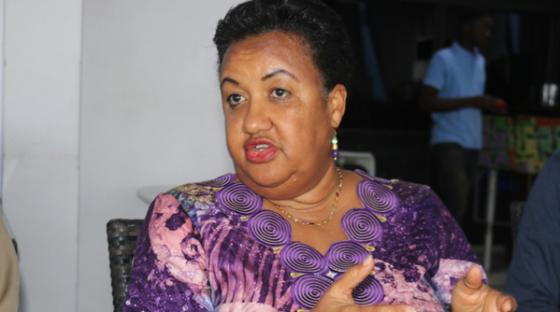Liberia: “We Need to Accelerate The Impact”

…Says Agriculture Minister
The Minister of Agriculture, Jeanine M. Cooper, says despite the progress made by the International Fund for Agricultural Development (IFAD) to develop agriculture in Liberia, there is a need to accelerate the impact in a smart way to attract more private sector investment.
According to her, projects funded by IFAD in the various agricultural value chains are having a significant impact on smallholder farmers' lives.
“We are proud of the strong foundation to invest in rural people that IFAD and the Liberian government are building together. But we need to accelerate the impact. We need to invest in a smart way and do more to attract the private sector for our intervention. We can do more to build a strong market and trade linkages for our farmers to transform their lives and help all to reach the collective goal to ending hunger by 2030.
Minister Cooper made the statement at the IFAD 13 Replenishment and 46th Session Governing Council event held in Rome Italy. IFAD is an organization based in Rome but is currently in Liberia investing in cocoa, rice, horticulture, and oil palm value chains, as well as the rehabilitation of feeder roads.
Cooper noted that with the IFAD project in the country, smallholder farmers and small and medium enterprises in the sector are accessing finance and other inputs to commercialize and increase productivity.
IFAD resumed work in the country in 2009, following a 20-year suspension as the result of the Liberian civil war. The project supports farmers in the cocoa value chain and the rural communities to reduce poverty. Its Tree Crop extension cocoa project is the first post war cocoa project that has helped to revamp the cocoa sector.
Cooper stated that Liberia faces numerous challenges, including high youth unemployment which is due to rapid urbanization, and women as key drivers of production have remained not empowered despite plans for inclusion.
The Minister said through the rehabilitation of cocoa farms that were dormant as the result of the Liberian civil war, the IFAD project had trained farmers in good agronomic practices and provided high quality, improved, and certified cocoa seedlings.
“By next year the national seed garden funded by IFAD will provide our farmers with certified high quality cocoa seedlings grown right here in Liberia.
She added that the project is also improving infrastructure by rehabilitating more than 200 kilometers of feeder roads in Nimba County.
“And this has significantly reduced travel times and transportation cost. If people were traveling over an hour before, the cost for transportation has also reduced.”
Minister Cooper mentioned that last year, the government of Liberia was pleased to welcome and sign the Host Country Agreement of the IFAD.
The overall goal of the host Country strategy is to increase income and employment opportunities for rural men and women while building resilience to climate change and food insecurity.
The Minister said that IFAD’s in-country presence means a lot for the country for stronger participation, adding that it is possible in the UN joint program in empowering rural women.
“We do see the establishment of the Center of Excellence for rural women in agriculture as the first of its kind.
The Agriculture Minister further mentioned the IFAD program has contributed to the Liberia Agriculture Commercialization (LACF), a grant program funded by the World Bank IFAD.
“The IFAD put some funding to approve access to finance for smallholder farmers and small and medium enterprises,” she explained.
However, the Minister mentioned that the IFAD project has contributed immensely to agriculture and there is a need to accelerate the impact.
Minister Cooper added that indeed Liberia’s agriculture is gradually transforming considering the growing numbers of commercial farms.
“The number of mechanized farm operators is increasing and food packaging goods are also increasing on the market in the last few years. We are using the LACF and other funding mechanisms to support the private sector to attract commercialization.
She said the government is also reviewing options to accelerate or to offer incentive packages to enterprises focusing on priority areas such as seeds, feeds, fertilizers and organic fertilizers development, and farm mechanization services.
